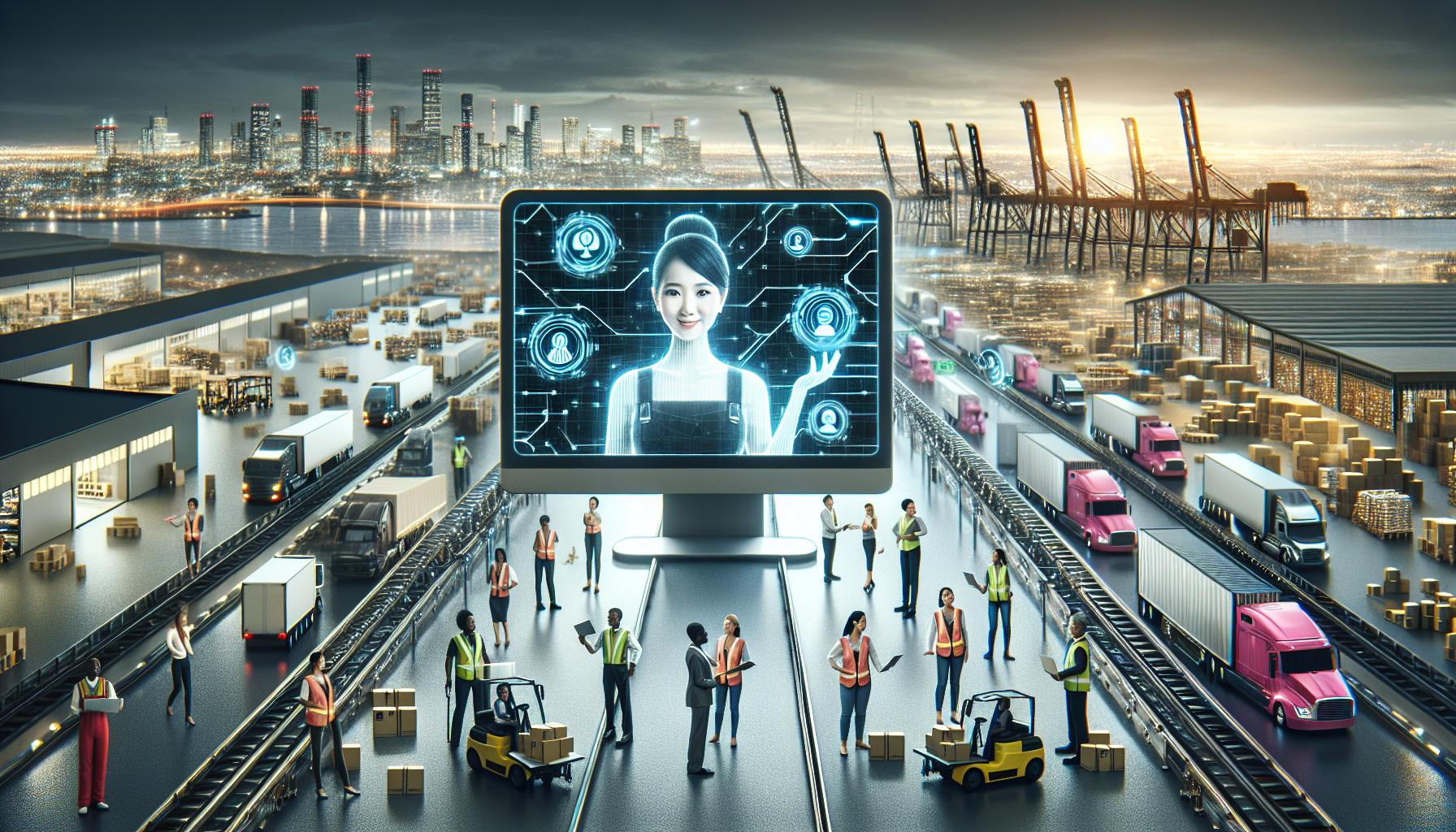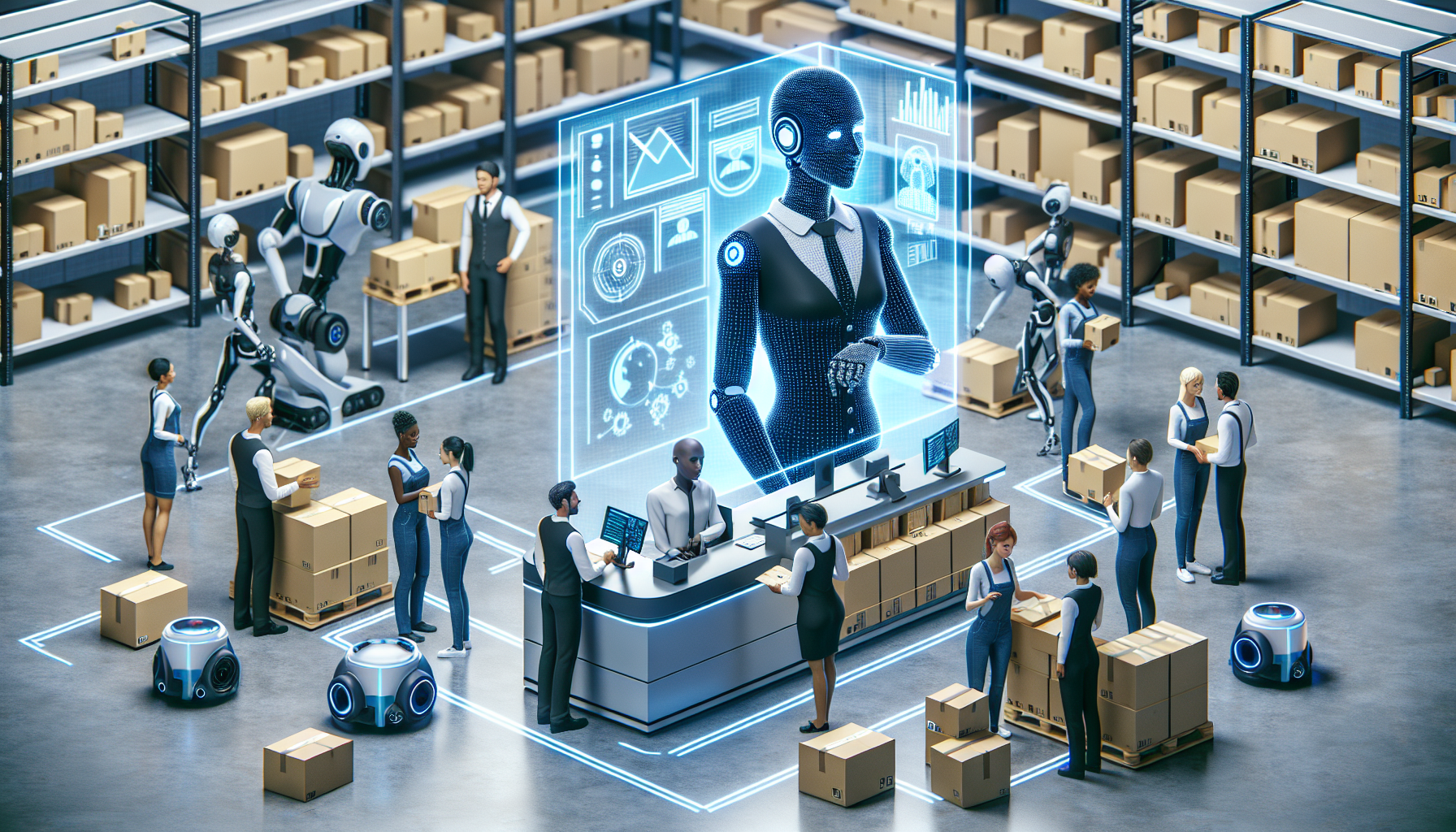
Artificial intelligence (AI) is revolutionizing various industries, showing a propensity for digital disruption that isn't limited to the tech sector. The logistics and supply chain industry is not an exception. It's evolving, incorporating AI tools such as AI receptionists into their operational frameworks to streamline processes and enhance efficiency.

AI receptionists, virtual customer service assistants driven by sophisticated AI technology, automate customer service in various sectors, including the supply chain. These AI-powered tools provide valuable assistance in automation, data analysis, and predictive tasks that are integral for a well-functioning logistics framework. Most importantly, they play a crucial role in addressing the demanding needs of the rapidly growing customer demands.
For instance, AI receptionists are used for automated order tracking, where they help customers review their order status promptly, eliminating the need to interact with a human agent. This translates to faster order processing times and improved customer satisfaction. Furthermore, by employing AI for tracking, companies can efficiently monitor their shipments, predict possible delays, and make necessary adjustments.
These smart assistants also facilitate tasks such as inventory management. By predicting demand and supply trends, they help businesses optimize inventory levels, minimizing storage costs and preventing stockouts. They play a significant role in terms of inventory optimization.
AI receptionists represent the ongoing trend of digital transformation within supply chain management. With their potential for automation and predictive analysis, they are poised to bring about transformative changes in the logistics and supply chain sectors, creating efficient, smart, and customer-centric operating systems.
In conclusion, AI receptionists, with their automated functioning and data-driven insights, are indeed revolutionizing the logistics and supply chain industry. Companies that embrace this digital transformation will have a competitive edge, with increased efficiencies, reduced costs, and improved customer service.
As the logistics and supply chain industry becomes increasingly complex, businesses are turning to innovative solutions to handle their customer interactions. AI receptionists, advanced pieces of technology similar to virtual assistants, are revolutionizing how companies manage these important touch points.
The cornerstone of an AI receptionist's capabilities is its call handling proficiency. AI receptionists can seamlessly handle incoming calls, direct callers to the correct department, and answer basic questions. More than just a glorified voicemail system, services like those from Virtual Receptionist utilize Natural Language Processing to understand and respond to callers in a conversational manner.
Secondly, AI receptionists optimize the scheduling of deliveries. Utilizing advanced algorithms, these systems can determine the most efficient delivery routes and times, confirm schedules with customers, and handle rescheduling requests. This level of automation decreases human error and promotes seamless coordination between all parties involved.
Lastly, AI receptionists grant customers a consistent, 24/7 line of communication for their inquiries. From tracking packages to general questions about services, AI receptionists provide immediate responses, increasing customer satisfaction. Such an AI-powered technology is a boon, considering the growing trend of customers having the preference for instant and hassle-free service.
The introduction of AI receptionists to the logistics and supply chain industry allows companies to streamline their operations, providing a higher level of customer service while freeing up their human resources for more complex tasks. As AI technology continues to advance, it's anticipated that we'll see these systems take on even more responsibilities, further revolutionizing the industry.
AI receptionists are altering the landscape of the logistics and supply chain industry by acting as the central hub of interaction, assimilating piles of data, and facilitating real-time communication. These artificially intelligent systems integrate flawlessly with existing logistics management software, bringing about a synergy that significantly boosts both data accuracy and operational speed.

This integration capacity ensures that all data, whether exchanged with suppliers, customers, or in-house teams, is consistent, up-to-date, and error-free. By removing the potential for human error in data entry, AI receptionists can eliminate costly mistakes and oversights that can hold back businesses in this competitive sector. With this level of accuracy, businesses can make informed decisions and avoid unnecessary costs, thereby increasing their profitability.
Additionally, the power of AI in fostering real-time communication can hardly be overstated. AI receptionists promptly process requests, inquiries, and orders, ensuring that all stakeholders are kept updated about the status of their transactions. This not only enhances the speed of operations but also results in increased customer satisfaction. In essence, these autonomous systems streamline supply chain operations by automating routine tasks and communication processes which were previously carried out manually, leading to greater productivity and efficiency.
In conclusion, by fostering seamless data integration and swift real-time communication, AI receptionists are revolutionizing the logistics and supply chain industry. By leaving mundane tasks to artificially intelligent systems, businesses can focus on strategic decisions and innovations that will propel them towards unprecedented growth.
The logistics and supply chain industry confronts a daunting challenge in keeping pace with escalating customer demands and market trends. One revolutionary solution comes in the form of AI receptionists, code-designed applications capable of handling expansive communication processes with impeccable precision.
Implementing these AI-oriented solutions not only improves task efficiency, but also allows businesses to effectively scale without proportionally expanding staff numbers. One of the significant ways AI receptionists influence the supply chain process is by contributing towards streamlining operations, transforming the logistics industry into a more responsive, data-driven sector. IBM's Research on AI's role in supply chain management provides valuable insights that solidify this concept.
In supply chain operations, engaging with partners and suppliers involves numerous exchanges of information. Traditionally, human receptionists would handle these interactions. However, the advent of AI receptionists now allows for 24/7 real-time communication with multiple partners without straining workforce resources. These AI-driven platforms can autonomously respond to simple queries, book appointments, and update information, facilitating smooth communication flow and enhancing overall efficiency.
Improving response time and enabling decisions based on real-time data are additional advantages that AI receptionists offer to the logistics sector. Leveraging AI, companies can make data-informed decisions and forecast variations in demand or supply. Forbes's article on AI's impact on business throws more light on this perspective.
Furthermore, AI receptionists play a crucial role in predictive analytics by monitoring data patterns for future trend predictions. By removing guesswork from the equation, businesses can reduce errors and increase profits, assuring a significant return on investment.
To summarize, the introduction of AI receptionists in the logistics and supply chain industry is a game-changer, catering to the increasing volume of communications and decisions to be made. Embracing this innovative technology ensures smoother operations, improved efficiency, and promising scalability, letting businesses meet the ever-mounting demands of this digital era. AI receptionists have become the backbone of this industry, leveraging the power of AI for the advantage of logistics and supply chain operations.
In the world of logistics and supply chain management, some prominent players have embraced the power of artificial intelligence, more specifically, AI Receptionists. Two such companies, DB Schenker and Expeditors, have implemented AI in their customer service departments and continue to reap astounding benefits.

DB Schenker, a leading global logistics provider, partners with IPSoft to use AI in its customer service operations. Their AI receptionist, named 'Schenker', significantly reduces the time spent by the human workforce on customer queries, ensuring immediate responses where appropriate. Using Amelia, IPSoft's AI engine, Schenker understands diverse languages, accents, and colloquial jargon and continuously learns from past interactions for better service.
On the other hand, Expeditors, a global logistics company, has leveraged the potential of an AI receptionist using the software Xenon. Xenon helps Expeditors handle customer inquiries around the clock without fatigue, continually ensures 24/7 service, overcoming time-zone buffers, and addresses inquiries with consistently high accuracy.
In conclusion, the implementation of AI receptionists within the logistics and supply chain industry has shown remarkable benefits. By enhancing customer service efficiency, providing around-the-clock support, and delivering high accuracy, AI Receptionists have decisively metamorphosed the way logistics companies operate and interact with their clients. Therefore, it's reasonable to predict a continuous increase in the adoption of AI receptionists in the industry.
```htmlDeepening the utilization of AI technology in the logistics and supply chain industry promises transformation on a monumental scale. Technological advancements have already begun to optimize operations, reduce costs, and streamline processes. Looking ahead, the integration of AI-based receptionists is set to revolutionize the industry with promising future trends.
One significant trend we expect to see on the horizon is the integration of AI-powered predictive analytics in logistics planning. This implementation can provide real-time, data-driven insights, enabling informed decision-making, predictive maintenance, and proactive problem-solving. This trend will not just revolutionize logistic companies' operational efficiency but also enhance their ability to deliver unparalleled customer service.
Another anticipated development is the incorporation of AI receptionists capable of multilingual support. Given the far-reaching scope of logistics and supply chain companies, investing in AI receptionists that can break language barriers will help provide seamless customer interactions, globally.
However, these advancements aren’t without their challenges. Operating in an industry highly reliant on trust and privacy, companies need to address potential concerns around cybersecurity and data privacy. In addition, substantial investment in research and development is needed to ensure these AI-based solutions are reliable, robust, and tailored to the unique demand of logistics operations.
To sum up, the integration of AI receptionists in the logistics and supply chain industry is set to have a transformative impact. With significant advancements on the horizon and challenges to overcome, this technology stands poised to revolutionize the industry’s future.
Start your free trial for My AI Front Desk today, it takes minutes to setup!








